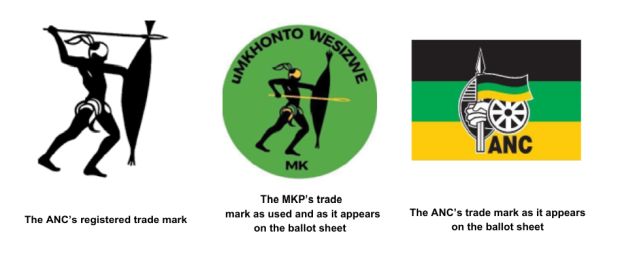That which is essentially 'dressed up' as a trade mark dispute is a battle between two opposing political parties - A line from the recent judgment discussed in this article.
The judgment
The recent South African High Court (KZN) judgment in the case of African National Congress ("ANC") v uMkhonto weSizwe Party ("MKP") and Another has been widely reported in the South African press. Although political parties are well-known for fighting amongst themselves, it is not often that they fight about trade marks!
Some politics
South Africa will have a national election on 29 May 2024, and some forecast that this may spell defeat for the ruling party, the ANC, that has been in power for the past 30 years. The ANC recently filed an urgent High Court application against an ANC-breakaway party called uMkhonto weSizwe (English: Spear of the Nation).
The High Court case - confusion at the ballot box
The High Court application filed by the ANC relates to the use of a logo. The claim is that the MKP has infringed the ANC's trade mark registration for its logo by using an identical or confusingly similar logo in terms of Sections 34(1)(a) and (c) of the Trade Marks Act. There is also a claim that there has been passing-off by the MKP.
The logos in discussion are as follows:

The ANC's argument is simple: for many voters in South Africa the name uMkhonto weSizwe and its logo are synonymous with the ANC and, as a result, there will be confusion at the ballot box.
The judgment
For purposes of this article, we will not discuss all of the issues covered in the judgment but will rather focus on the IP issues.
Jurisdiction
MKP challenged the court's jurisdiction, arguing that this was a matter for the Electoral Court. Judge Chetty agreed:
'I agree with the MKP that the ANC's right of recourse was an appeal or review to the Electoral Court to challenge the dismissal of its appeal lodged on 20 September 2023. The ANC chose the wrong forum to assert its rights. This court has no jurisdiction.'
Yet the judge went on to discuss the merits!
Legislation
Section 34(1)(a) deals with the unauthorised use of an identical or confusingly similar trade mark, used in the course of trade, in relation to the same goods or services. The case of Bata Ltd v Face Fashions CC 2001 (1) SA 844 (SCA) tells us that with Sections 34(1)(a) and (c) the 'only question to be decided... is whether the appellant has established that a substantial number of persons will probably be deceived into believing or confused as to whether there is a material connection in the course of trade.'
Case law
The leading case of Plascon Evans Paints Ltd v Van Riebeeck Paints (Pty) Ltd (1984) ZAQSCA 118 always comes up. It tells us that:
- The trade marks should be compared side-by-side.
- It is sufficient to show that a 'substantial number' of people will 'probably be confused as to the origin of the goods'.
- It is necessary to have 'regard to the similarities and differences in the two marks'.
- The notional customer has 'average intelligence... proper eyesight' and exercises 'proper caution'.
- Regard must be had to the 'sense, sound and appearance of the marks'.
- The trade marks must be considered 'as they would be encountered in the marketplace', as well as 'side-by-side but also separately.
- The reality of 'imperfect recollection' must be considered, as must the concept of 'general impression'.
Differences between the trade marks
The judge said that 'apart from the distinctive green background, on observation, the registered mark of the ANC and that used by the MKP are similar, although a careful eye will notice a difference at the height in which the spear is held by the warrior.'
No deception or confusion
The judge held that it has not been established that the trade marks resemble each other so closely that deception or confusion among voters is likely to arise.
The judge said that 'although the registered mark of the ANC is similar to the symbol used by the MKP (the African warrior with the spear), the marks are sufficiently distinguishable ...by reason of the distinctive green background used by the MKP... the use of the mark by the MKP will not likely lead to a conclusion by a voter that there is a link between the MKP and the ANC.'
The result
The judge held that the ANC had 'failed to establish a clear case for final relief, either to the name or to the use of its registered mark.'
Electoral Court – an alternate remedy
The judge said that the ANC 'had an alternate remedy of approaching the Electoral Court to undo the registration of the MKP...it could have achieved substantial redress in that court...in the light of the conclusions I have reached...the application falls to be dismissed.'
The ANC has already noted its intention to appeal.
Reviewed by Gaelyn Scott, Head of ENS' IP Practice.
The content of this article is intended to provide a general guide to the subject matter. Specialist advice should be sought about your specific circumstances.


